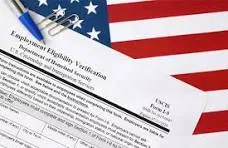
The Federal Government will soon begin audits of business’ and other employer’s I-9 forms. The I-9 is a form of the U.S. Department of Homeland Security that is designed to “verify the identity of and employment authorization of individuals hired for employment in the United States.” In other words, the I-9 form, which the employer and employee fill out on the date of hiring, documents that the employee is a legal resident of the United States and is eligible and authorized to work in the United States.
David Adams, an I-9 consultant in Coleman, Texas, is trying to get the word out to area employers to make sure their I-9 files are in order, before the audits begin. “Everybody needs to know about this because it’s coming. There is not a proper sense of urgency, is my fear, amongst smaller employers.”
The I-9 came into being in 1986 under the Reagan Administration. “The I-9 was instituted under Reagan to move the border wall from the border to the employer. The idea was that if you don’t hire illegal immigrants, they won’t come across the border,” said Adams.
The auditing and enforcement of the I-9 forms was relaxed during the COVID pandemic. But now that the COVID emergency is declared to be over, the audits will ramp up. Plus the election of Donald Trump as President, and his appointment of Tom Homan as Border Czar, promise to increase pressure on I-9 audits, according to Adams. “Tom Homan has said the I-9 will be their mechanism for enforcement (of immigration control).” The industries most likely to be targets for an audit are agriculture, construction, and restaurant/hospitality.
While the I-9 form appears to be simple, Adams says it contains 40 to 50 fields that must be completed correctly. Smaller employers typically use a paper I-9, while larger employers use an electronic version. “I’ve never seen a case where the I-9 records didn’t include paperwork violations.” The fines could run from a few hundred dollars to several thousand dollars. “More than likely they will be reasonable about it if you’ve tried to do your best and just were not familiar with things,” said Adams. “They might give you a chance to remediate your forms after they inspect them and not fine you at all. And that’s great if they do. But they could fine you, and in many cases they do.”
If an employer uses an electronic version of the I-9, there can still be problems. Adams said he knows of five or six electronic I-9 systems that are good, but many others are not. “Abercrombie and Fitch was fined $1-million because the electronic I-9 system they were using did not meet the criteria in the Federal Register.” So even electronic I-9 records need to be reviewed before an audit.
I-9’s must be kept for three years after an employee is hired, or one year after the end of employment, whichever date is later. At that point the I-9’s can be destroyed. But any I-9’s still on file, even after the required retention date has passed, are still subject to inspection and potential fines. “I feel an urgency to get this message out before Tom Homan starts inspecting all these I-9’s and fining people right and left,” said Adams.
Chris Thomas, Partner in the law firm of Holland & Hart LLP in Denver, Colorado, in recent discussions with the Department of Homeland Security reports that, as one senior agent put it, “We are tired of employers hiding behind noncompliant electronic I-9 vendors. As part of our effort to break the employment magnet, we intend to engage in a dramatic increase in I-9 audits and to focus, in particular, on electronic I-9’s, particularly the audit trails, the affirmative acknowledgment of the attestations, and other frequent areas on noncompliance.”
David Adams has over twenty years of experience as an I-9 consultant for employment screening firms and electronic I-9 publishers, and is offering his expertise to Central Texas employers. “For area employers, within about 100 miles of Brownwood, I will talk with them for one-to-four hours, and in some cases go on site, and have a free look at things and tell them what to be concerned about.” If corrective action is needed, Adams will be available for hire. His phone number is 325-636-3082. Alternatively, Adams suggests you consult with your own legal counsel or an attorney who specializes in employment law.
If any I-9 records are defective, they can and should be corrected before an audit, according to Adams. “A decent nice auditor for ICE (Immigration and Customs Enforcement), if you’re not doing something egregious, if it’s just ignorance, or some small degree of carelessness, will probably give you the opportunity to remediate those I-9’s and may give you only a token fine. But they might not.”